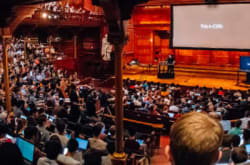Images
This course explores the artistic aspects, scientific foundations, and techniques of digital photography with the goals of enabling students to expand their knowledge of photography as an art form, to develop a deeper and broader understanding of the scientific basis of photography, to improve their photographic technique, and to effectively use photographic software tools. Although the primary focus is on digital photography, many concepts apply to other photographic disciplines including film and video. Topics include quality of light, exposure control, depth of field, aesthetics, composition and patterns, perspective, color science, the human visual system, spatial and color perception, exposure, metering, digital sensors, optics, analogies to biological systems, color filter arrays, file formats, sensor linearity, color spaces and profiles, optical and computational image artifacts, and software tools and techniques for modification and enhancement. Through lectures, hands-on assignments, and critiques, students expand their understanding of digital photography while exploring their creativity to broaden the possibilities and improve the quality of their photographs. Upon successful completion of the course, students can expect to take photographs with an intuition of the camera's behavior, and its limitations, and an ability to think critically about light and the resulting appearance of a photograph.
Students should have access to a camera with a manual mode and an option for RAW for the duration of the course.
Similar resources
As a research university and nonprofit institution, Harvard is focused on creating educational opportunities for people from many lived experiences.
Academic offerings for many kinds of learners
Harvard has 12 degree-granting Schools and the Harvard Radcliffe Institute. We also offer countless non-degree opportunities for professional and lifelong learners, including executive education, continuing education, and online courses.

Observing with NASA

Introduction to Computer Science











